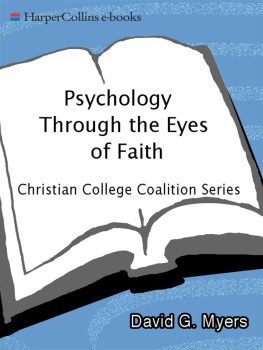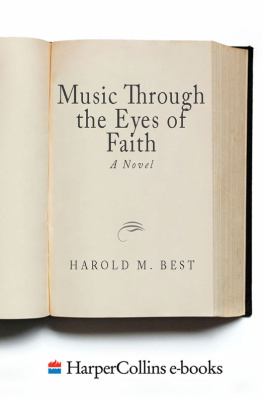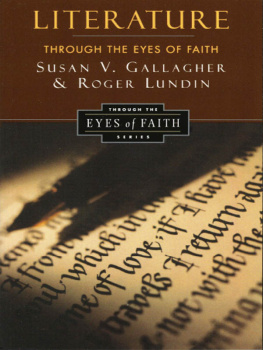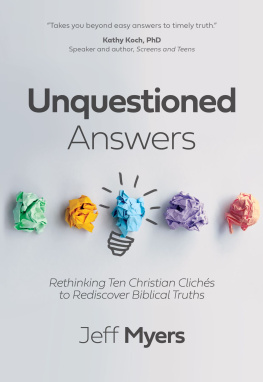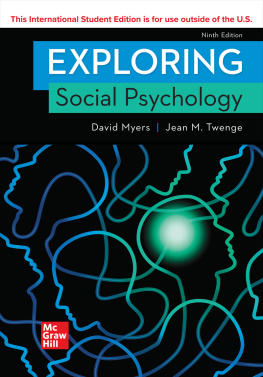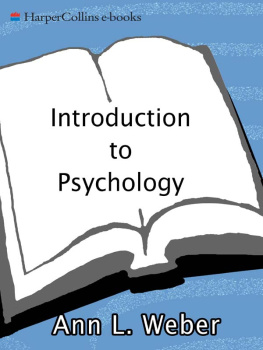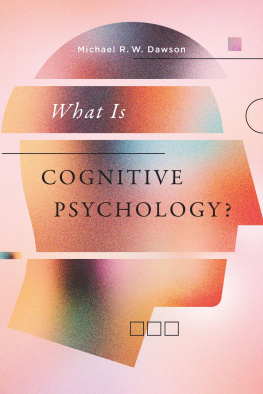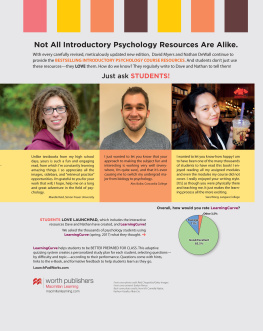CONTENTS
Introduction
Lessons from the Past: Science and Christian Faith
Levels of Explanation
Should There Be a Christian Psychology?
Biological Bases of Behavior
The Brain-Mind Connection
Biblical Images of Human Nature
Evolutionary Psychology and Human Uniqueness
Human Development
On Living Peaceably with the Mysteries of Faith
How Much Credit (and Blame) Do Parents Deserve?
Finding Your Path on the Journey of Life
Sensation and Perception
The Mystery of the Ordinary
Through the Eyes of Faith
States of Awareness
The Day of Rest
Learning
Are We Determined or Free?
Memory
Memorable Messages
Thinking and Language
To Err Is Human
Superstition and Prayer
Science and the New Spirituality
Watch Your Language
Intelligence
You Are Gifted
Motivation
To Accept or to Change?
And God Said, It Is Very Good
Forgiveness: What It Takes and What It Gives
Emotion
Wealth, Well-Being, and the New American Dream
This Way to Happiness
Personality
A New Look at Pride
The Power of Positive Thinking
Psychological Disorders
Is Christianity Beneficial or Hazardous to Your Mental Health?
Therapy
Values in Psychotherapy
Social Psychology
Nice People and Evildoers
Behavior and AttitudesAction and Faith
The Fruit of the Spirit
Conclusion
The Psychology of Religion

Revised and Updated Edition
PSYCHOLOGY THROUGH THE EYES OF FAITH . Copyright 2003 by the Council for Christian Colleges & Universities, formerly known as Christian College Coalition. All rights reserved under International and Pan-American Copyright Conventions. By payment of the required fees, you have been granted the non-exclusive, non-transferable right to access and read the text of this ebook on-screen. No part of this text may be reproduced, transmitted, down-loaded, decompiled, reverse engineered, or stored in or introduced into any information storage and retrieval system, in any form or by any means, whether electronic or mechanical, now known or hereinafter invented, without the express written permission of HarperCollins ebooks.
Library of Congress Cataloging-in-Publication Data
Myers, David G.
Psychology through the eyes of faith / David G. Myers and Malcolm A. Jeeves.[2nd ed.].
p. cm.
Includes bibliographical references (p.) and index.
ISBN: 9780060655570.
ChristianityPsychology. I. Jeeves, Malcolm A. II. Title.
BR110 .M94 2002
261.5'15dc21
2002032727
07 08 09 10 11 RRD(H) 10 9 8 7 6 5 4 3 2 1
EPub Edition JUNE 2013 ISBN: 9780062300430
What are human beings that you are mindful of them,
mortals that you care for them?
P SALMS 8:4, NRSV
T his book is about the relationship between what psychologists are discovering and what Christians believe. Unlike most other books on psychology and religion, this one is not primarily concerned with what psychologists have said about religion, with the speculations of personality theorists, or with a Christian approach to counseling. Rather, it identifies major insights regarding human nature that college and university students will encounter in a basic psychology course and ponders how the resulting human image connects with Christian belief.
Readers will, we hope, include all sorts of intellectually curious people, including students eager for a Christian perspective on some of the provocative new developments in psychology. With students needs in mind, we have written short essays on many of the big issues in psychology and religion and arranged them to correspond with the sequence of topics often studied in a first course on psychology.
This books first edition benefited from the advice and encouragement of dozens of psychology professors from the member colleges of the Council for Christian Colleges and Universities. We especially benefited from stimulating discussions with the Councils psychology advisory committee: David Benner, Mark Cosgrove, Bert Hodges, Cecil Paul, and Mary Vander Goot. The philosopher Nicholas Wolterstorff, editor in chief for this pioneering series of books, and the Council of Christian Colleges and Universities executives John Dellenback and Karen Longman provided much warm-hearted encouragement from beginning to end.
For support with this second edition we are especially grateful to Bert Hodges (Gordon College) for his careful critique, to Julia Roller at Harper San Francisco for her deft and meticulous editing, and to Phyllis Vandervelde and Kathryn Brownson for their excellent help in producing the manuscript.
LESSONS FROM THE PAST: SCIENCE AND CHRISTIAN FAITH
I am free, I am bound to nobodys word, except to those inspired by God; if I oppose these in the least degree, I beseech God to forgive me my audacity of judgment, as I have been moved not so much by longing for some opinion of my own as by love for the freedom of science.
NATHANIEL CARPENTER, PHILOSOPHIA LIBERA, 1622
Reality is a nuisance to those who want to make it up as they go along.
AUSTIN FARRER, SAVING BELIEF, 1964
O ver the last centurypsychologys first full centurydefinitions of the field have varied. For its first forty years psychology was, as William James declared in his pioneering 1890 text, The Principles of Psychology, the science of mental life. During the next forty years, from the 1920s into the 1960s, it was the science of behavior. Todays textbooks commonly synthesize this history by defining psychology as the science of behavior and mental processes. Note what all these definitions have in common: that psychology aspires to being a science.
Toward the end of the twentieth century, the Harvard psychologist Howard Gardner cautioned that psychology has not added up to an integrated science, and is unlikely ever to achieve that status. Yet he noted that it was important to recognize insights achieved by psychologists; to identify the contribution which contemporary psychology can make to disciplines which may some day achieve a firmer scientific status; and finally to determine whether at least parts of psychology might survive as participants in a conversation which obtains across major disciplines.
Psychologys claims to be a science are justified today by its solid achievements in both pure and applied research. Claiming the status of a science implies also acknowledging the limits of science. These limits are not imposed by Christian belief but are shared by humanists and scientists alike. There has, however, been a trend in recent years for somenotably, postmoderniststo argue that scientific knowledge is subjective. Some Christians, mistakenly believing that by weakening the objectivity of scientific knowledge they might strengthen the claims of religious knowledge, have at times succumbed to the temptation to endorse such views. Max Perutz, a Nobel laureate in molecular biology and himself a Christian concerned about the postmodern challenge to the future of science, notes: This is a caricature of modern sciencethe bulk of scientific knowledge is final. If it were not, jet planes could not fly, computers would not work and atomic bombs would fail to explode.
As part of that conversation, this book asks, What is the relationship between Christian faith and psychology? To answer that we must take a brief look at the history of relations between faith and science.

